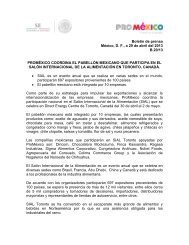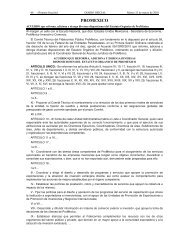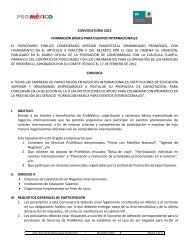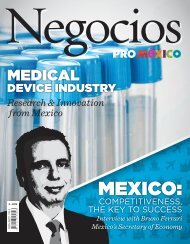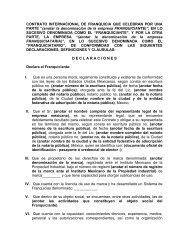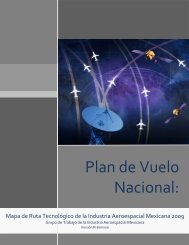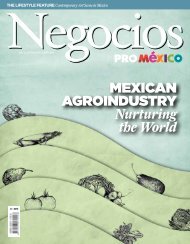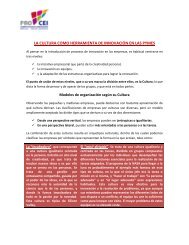AUTOMOTIVE IndUsTrY In MExIcO Ready to Overtake - ProMéxico
AUTOMOTIVE IndUsTrY In MExIcO Ready to Overtake - ProMéxico
AUTOMOTIVE IndUsTrY In MExIcO Ready to Overtake - ProMéxico
Create successful ePaper yourself
Turn your PDF publications into a flip-book with our unique Google optimized e-Paper software.
30 Negocios <strong>ProMéxico</strong> Negocios <strong>ProMéxico</strong> 31<br />
VolkswageN<br />
IN MexICo<br />
FroM the “Bug”<br />
<strong>to</strong> the hyBrid cAr<br />
Volkswagen has been deeply involved in the evolution of the Mexican<br />
au<strong>to</strong>motive industry over nearly five decades, establishing itself as a major<br />
genera<strong>to</strong>r of jobs and a training center for thousands of au<strong>to</strong> workers.<br />
____<br />
Since the second half of the 20th century, Volkswagen has<br />
won a place in the contemporary his<strong>to</strong>ry of Mexico as a<br />
major promoter of the au<strong>to</strong>motive industry, even creating<br />
a Mexican pop culture classic, the Type 1 model, also<br />
known throughout the country as the Vocho ”Bug”.<br />
“<strong>In</strong> Mexico, like in Germany and Brazil, this model was an<br />
important element for mo<strong>to</strong>rizing the country,” recalls Thomas<br />
Karig, direc<strong>to</strong>r of Corporate Relations and Strategy at Volkswagen<br />
de México, referring <strong>to</strong> the car that the German company produced<br />
at its plant in Puebla until the year 2003.<br />
At the current juncture, with Mexico positioned between the<br />
main producers and exporters of light and commercial vehicles<br />
for the global market, Volkswagen is also going through a stage<br />
by omar magaña<br />
pho<strong>to</strong>s courtesy of volkswagen<br />
of transformation and growth and is now taking advantage of<br />
the acceleration being experienced by the country’s au<strong>to</strong>motive<br />
industry while adjusting itself <strong>to</strong> new technological needs<br />
within the sec<strong>to</strong>r.<br />
“We’re about <strong>to</strong> start up an engine plant in Silao, Guanajua<strong>to</strong>,<br />
for later this year, which will provide a new generation of engines<br />
both for the Puebla plant as well as for the one in Chattanooga, in<br />
the US,” reports Karig.<br />
Meanwhile, the Cuautlancingo, Puebla plant –with which Volkswagen<br />
started operations in Mexico in 1967 and which set a new<br />
record by producing 500,000 units in 2011, exceeding the 450,802<br />
units produced in 2008– is currently working on the hybrid version<br />
of its Jetta model, featuring thermal and electric mo<strong>to</strong>rs.<br />
Volkswagen is the world’s third largest producer of light and<br />
commercial vehicles, with 7.3 million units emerging each year<br />
from its 48 production facilities located in Germany and six<br />
countries in the Americas, Asia and Africa. Moreover, it’s at the<br />
forefront of companies that have invested in the research and<br />
production of environmentally-friendly diesel engines, which<br />
are smaller and ensure higher performance with lower fuel consumption.<br />
The investment made by the firm for the manufacture of such<br />
engines in Mexico amounts <strong>to</strong> 550 million usd and the company<br />
expects an annual production of 330,000 units at its plant in Silao.<br />
Between the company’s arrival in Puebla and this recent<br />
initiative, Volkswagen de México has gone through three major<br />
stages, described by Karig as follows: the first runs from the 60s<br />
<strong>to</strong> the late 80s, the period in which the company mainly supplied<br />
the domestic market. It was marked by the Safari, Combi, Brasilia<br />
and Caribe lines, established as iconic names in the country’s<br />
au<strong>to</strong>motive market.<br />
The second stage lasted from the late 80s until the signing of<br />
the NAFTA in 1992, a time when the world economic downturn<br />
pushed the company <strong>to</strong> move production from its plants in the US<br />
<strong>to</strong> Puebla, from where it met the North American market demand.<br />
<strong>In</strong> the third and current stage, Volkswagen de México concentrates<br />
fully on car exports, taking advantage of the benefits arising<br />
from many free trade agreements signed between the country and<br />
the rest of world.<br />
The Beetle was born in 1997 and became the firm’s first vehicle<br />
manufactured in Mexico for sale on the international market. It<br />
<strong>to</strong>ok just a few years for the updated and modern sedan with the<br />
“hump” <strong>to</strong> entirely replace its predecessor, the legendary “Bug”.<br />
By the end of 2012, the Puebla plant will have produced 300,000<br />
Jetta vehicles, 120,000 Beetles, 120,000 Golf Sport Wagons, and<br />
50,000 Jetta Classics, according <strong>to</strong> estimates by Karig. About 80%<br />
of that production will be exported, with the US and Canada as<br />
major destinations.<br />
Prior <strong>to</strong> the initiative of the diesel engine plant in Silao, the German<br />
firm had announced its intention <strong>to</strong> strengthen and expand<br />
its participation in Mexico. <strong>In</strong> 2009, it invested one billion usd <strong>to</strong><br />
expand its plant in Cuautlancingo, Puebla for the construction of<br />
what’s known as the Western Segment, from where the sixth generation<br />
Jetta model units have emerged since mid 2010.<br />
That has led <strong>to</strong> a payroll increase within Volkswagen de México,<br />
considered the company that generates the most jobs in the state<br />
of Puebla –Karig reports the presence of 18,500 employees.<br />
<strong>In</strong> fact, throughout these nearly five decades, the company has<br />
maintained its reputation not only as a crea<strong>to</strong>r of jobs but also, and<br />
above all, as a great mechanics teaching workshop where generations<br />
of au<strong>to</strong>motive technicians have been trained. That is another<br />
key point for the firm’s attachment <strong>to</strong> its environment.<br />
“Every person in the workplace must have well-founded and<br />
precisely-targeted theoretical and practical knowledge in order <strong>to</strong><br />
undertake their tasks perfectly,” notes Karig.<br />
On the one hand, there are the high school graduates who enter<br />
the plant and go through a process of technical training for over<br />
three years, after which they get their diploma; and on the other,<br />
engineering graduates passing through a period of “training and<br />
apprenticeship including, in many cases, classes in Germany for a<br />
year or two,” explains Karig.<br />
“The product is constantly modified and adapted and those are<br />
activities carried out by engineers from our technical development<br />
area in Mexico. That was the case with the new Jetta; much of the<br />
detailed engineering of the vehicle was done here,” Karig says.<br />
After a long his<strong>to</strong>ry of productive relationship with Mexico, an<br />
experience that other competi<strong>to</strong>rs in the industry are just beginning<br />
<strong>to</strong> develop, Volkswagen foresees a profitable future due <strong>to</strong><br />
its vast knowledge of the features of the workforce in the country.<br />
With the numbers rising in Puebla and the start of activities<br />
in Silao, the best is still <strong>to</strong> come. According <strong>to</strong> Karig, the most<br />
important of these movements within the industry is the effect<br />
generated between large and medium companies that supply<br />
au<strong>to</strong> parts and specialized technology because they recognize<br />
the appeal of setting up in Mexico <strong>to</strong> be near the assembly plants<br />
they s<strong>to</strong>ck, encourage competitiveness and, most importantly,<br />
create jobs. n<br />
www.volkswagen.com



